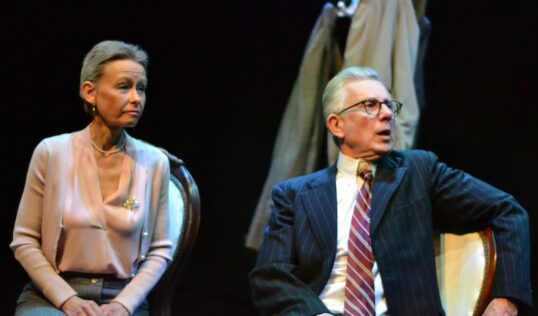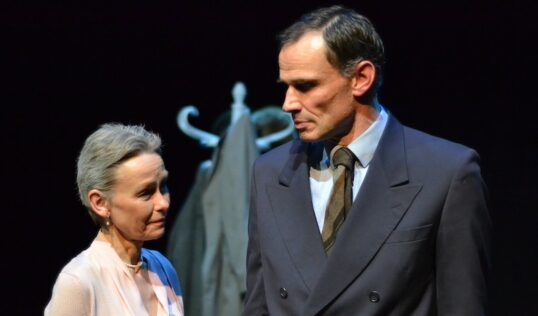Copenhagen
★★★★☆ Stimulating and engaging
Assembly Roxy: Wed 17 – Sat 20 May
Review by Allan Wilson
In Michael Frayn’s Copenhagen at the Assembly Roxy, Edinburgh Graduate Theatre Group tackle a difficult, sometimes impenetrable, play with intelligence and skill.
Copenhagen examines the moral responsibility of scientists in times of war by focusing on the 1941 meeting between nuclear physicists Neils Bohr and Werner Heisenberg in Copenhagen, particularly on why Heisenberg went there.
Copenhagen opens with the spirits of Bohr (Lawrence Wareing), his wife Margarethe (Helen Goldie) and Heisenberg (Alan Patterson) meeting in some undefined afterlife to reflect on their differing memories of the past friendship between them and the meeting in Copenhagen which led to the end of their relationship.
Drifting through time, they each have different memories of key events from the past and opt to reset the narrative with a new draft whenever it becomes hard to reconcile these differences.
This non-linear approach to storytelling is initially confusing, but it is soon clear that it doesn’t really matter if a particular comment was made in 1924, 1941, or 1947. The uncertainty of memory is an ongoing theme, as befits a play about Heizenberg, for whom the Uncertainty Principle is named.
particularly passionate
The cast are universally excellent in their roles, with Wareing and Patterson showing the genuine warmth in the relationship between the scientists as they walk together, engrossed in their scientific discussions. The pair succeed in making a complex, science-based script comprehensible, even when the scientists’ tempers become frayed as they discuss the ethics of their contributions to the development of the atomic bomb
Patterson’s Heisenberg is particularly passionate about his views, sometimes addressing the audience directly to explain his actions. Goldie’s Margarethe Bohr is an interesting character, taking part in the ethical discussions and trying to be a peacemaker with offers of tea and cake when the arguments threatened to boil over.
The play is very text-based, with no real action on stage, which can present challenges for the production team. Director Ross Hope and his team have adopted an understated, but effective approach, rather than the more abstract set that some productions have adopted. For the opening scene with the spirits, ghostly white sheets cover various objects on the stage. These are quickly removed to reveal four chairs, two tables and a coat stand, all of which are used at various stages of the production.
J. Gordon Hughes’ lighting and Dug Campbell’s sound take the same subtle approach, used to enhance key moments of the play, but never intruding.
When a script is heavy on text it can be difficult to get the pacing of a play just right. Some early productions of Copenhagen were criticised for being slow and plodding. That is definitely not the case for the EGTG production.
rapid fire dialogue
Wareing and particularly Paterson deliver rapid fire dialogue that is full of energy and clarity, but there are times, during Bohr and Heisenberg’s discussions of complex scientific ideas, such as the Uncertainty Principle, Matrix Mechanic’s and Schrodinger’s Cat, when the text could be given a little more space to breathe to help the audience.
That the production run 20 minutes shorter than advertised in the programme may indicate that Ross Hope has placed a little too much emphasis on keeping up its pace; rather than giving the audience a chance to absorb a complex text.
Michael Frayn’s play is certainly challenging, particularly for the actors, but the EGTG production rises to the challenge to provide a stimulating and engaging evening.
Running time: Two hours and 25 minutes (including one interval)
Assembly Roxy, 2 Roxburgh Place, EH8 9SU.
Wed 17 – Sat 20 May 2023.
Evenings: 7.30pm. (Upstairs)
Tickets and details: Book here.
ENDS




















